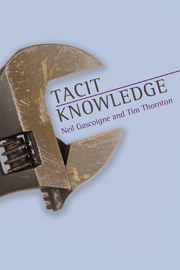2 - Knowing how and knowing that
Summary
INTRODUCTION
Chapter 1 introduced tacit knowledge through the work of Polanyi, Ryle and Heidegger. We highlighted an initial connection between Polanyi's slogan that “we can know more than we can tell” and an emphasis both on the personal and practical. One indicator of this connection is a shared concern to undermine an overly (“Cartesian”) impersonal and intellectual conception of the knower and of their cognitive achievements and a method characterized by the deployment of versions of a regress argument. The purpose of the regress arguments can be seen in the light of the three competing principles to which tacit knowledge might be subject:
PC All knowledge can be fully articulated, or codified, in context-independent terms.
PI There can be knowledge that cannot be articulated.
PA All knowledge can be articulated, either in context-independent terms or in context-dependent terms.
The regress arguments target a conception of knowledge constrained by PC. Their purpose is to demonstrate that we are entitled to the concept of explicit knowledge only if we acknowledge that its achievement is grounded in something more fundamental. That leaves open the competing possibilities marked by PI and PA. Rejecting PI, we suggested that tacit knowing, construed in terms of context-dependent knowing how (the sort of activity-dependent understanding that is manifest in practice), resists codification in purely linguistic context-independent terms but can be regarded, nevertheless, as fully determinate (thus satisfying PA) under the appropriate analysis.
Information
- Type
- Chapter
- Information
- Tacit Knowledge , pp. 51 - 80Publisher: Acumen PublishingPrint publication year: 2013
